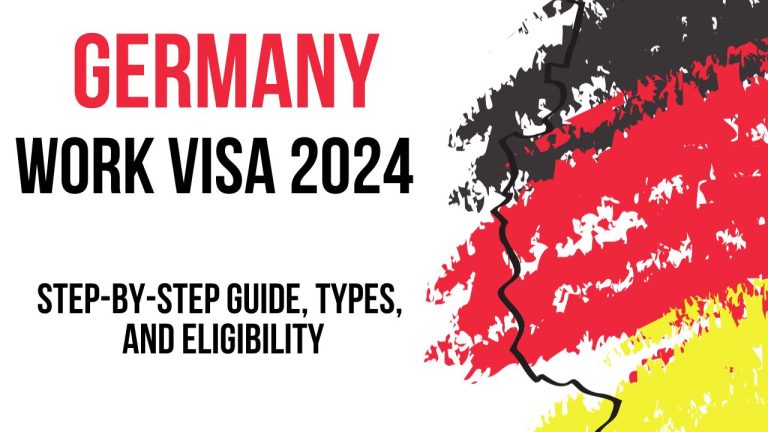Germany, the land of engineers and philosophers, beckons ambitious minds from across the globe. Whether you seek to hone your academic prowess or contribute your skills to its thriving economy, Germany offers a multitude of opportunities. But before you pack your bags and dust off your German (or start learning!), navigating the visa landscape can feel like deciphering a complex code. Fear not, aspiring professionals and scholars! This blog post serves as your decoder ring, guiding you through the essential steps of obtaining a German visa for work or study.
Work and Study Visas: Two Distinct Paths
While both work and study visas allow you to reside in Germany, they cater to different purposes. Understanding the distinction is crucial for a smooth application process.
- Work Visa (Beschäftigungserlaubnis): This visa is required for most non-EU citizens who wish to work in Germany. It’s typically tied to a specific job with a specific employer and needs renewal if you change jobs.
- Student Visa (Studienaufenthaltserlaubnis): This visa allows you to pursue higher education at a recognized university or vocational school in Germany. It’s typically valid for the duration of your studies, with the possibility of extension.
APPLICATION PROCESS: HOW GET to German Work Permits
Identifying the Right Visa for You:
Choosing the right visa hinges on your primary objective. Are you aiming to:
- Work full-time for a German company? Apply for a work visa.
- Complete an internship or participate in a vocational training program? You might qualify for a specific type of work visa depending on the program.
- Pursue a bachelor’s, master’s, or doctoral degree? Apply for a student visa.
- Attend a language course to improve your German? Depending on the length of the course, you might require a student visa or a short-stay visa.
The Application Process:
The application process for a German visa typically involves these steps:
- Gather Required Documents: This will vary depending on the visa type, but common requirements include a valid passport, proof of financial resources, health insurance, a completed visa application form, and potentially your diploma or acceptance letter from a German institution.
- Schedule an Appointment: Contact the German embassy or consulate in your home country to schedule an appointment for visa submission.
- Attend the Appointment: During your appointment, you’ll submit your documents, pay the visa application fee, and might have a brief interview.
- Processing Time and Visa Issuance: Processing times can vary depending on the workload of the authorities and your specific case. However, you can expect to wait anywhere from a few weeks to several months.
CHECK: Jobs in Germany: Jobs at Julius Berger
Additional Considerations:
- Language Skills: While German language proficiency is not always mandatory, demonstrating basic German skills can strengthen your application and ease your integration into German life.
- Cost of Obtaining a Visa: There are associated fees for applying for a visa. Research the specific fees for your chosen visa type.
- Work Permit for Work Visas: Remember, a work visa is often tied to a specific job offer. Your employer will typically initiate the work permit application process on your behalf after you secure the visa.
Essential Resources for Work and Study Visas:
- The German Federal Foreign Office: https://www.germany.info/us-en/service/visa (Official website with comprehensive information on visa types, application procedures, and required documents)
- The German Missions Abroad: Many German embassies and consulates offer specific guidance and support with visa applications. Locate your nearest embassy or consulate through the Federal Foreign Office website.
- The Federal Office for Migration and Refugees (BAMF): https://www.bamf.de/EN/Startseite/startseite_node.html (For more information on residence permits and integration in Germany)
Beyond the Visa: Preparing for Your German Adventure
Once you secure your visa, Germany awaits with its rich history, vibrant culture, and stunning landscapes. Here are some additional resources to help you prepare for your journey:
- Make it in Germany: https://www.make-it-in-germany.com/ (English website with information on living, working, and studying in Germany)
- DAAD (German Academic Exchange Service): https://www2.daad.de/deutschland/studienangebote/international-programmes/en/ (For information on higher education opportunities in Germany)
- Local expat forums and communities: Connecting with other expats can provide invaluable support and insights into daily life in Germany.
Embrace the Opportunity:
Germany beckons with its potential for professional and academic growth, steeped in a culture that values innovation and excellence. By understanding the visa process, taking the necessary steps, and embracing the cultural nuances, you can unlock the door to a rewarding experience in Germany. Here are some additional tips to keep in mind:
- Start Planning Early: Visa applications can take time, so begin researching and gathering documents well in advance of your desired arrival date in Germany.
- Be Thorough and Organized: Ensure your application is complete and all documents are properly translated and certified if necessary.
- Demonstrate Financial Stability: Proof of sufficient financial resources is crucial, especially for student visas.
- Research Accommodation Options: Finding suitable accommodation, especially in larger cities, can be challenging. Start your search early and consider temporary housing options if needed.
- Learn Basic German: While fluency isn’t always mandatory, basic German skills go a long way in daily life and demonstrate your commitment to integration.
- Embrace the Cultural Differences: Germany has a unique culture with its own customs and social etiquette. Be open to learning and adapting to ensure a smooth transition.
Germany Awaits:
Whether you’re seeking to excel in your chosen field or immerse yourself in academic pursuits, Germany offers a multitude of opportunities. With the right visa, a dash of planning, and an open mind, you can turn your German dream into a reality. So, embark on your visa journey, embrace the adventure that awaits, and get ready to experience the wonders of “Deutschland”!

